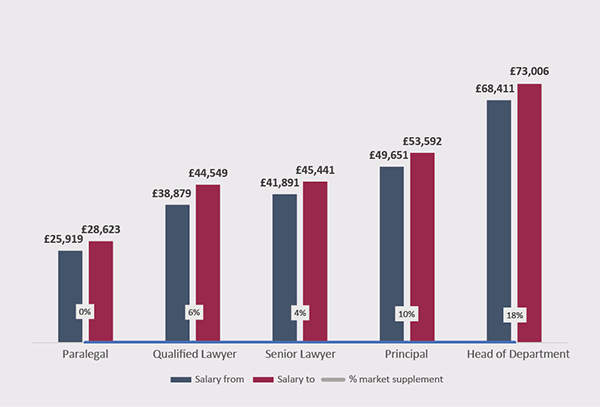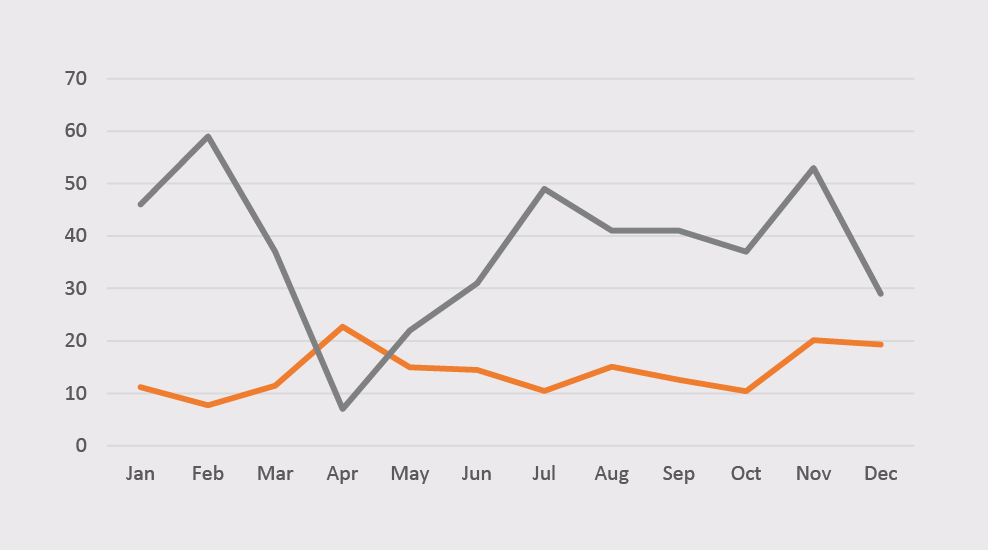- Details
Recruitment Market Report 2021
Using data from over 2000 local authority legal jobs published on Public Law Jobs between 2017 and 2020, Adam Carey reports on how local government lawyers' salaries and council recruitment fared over the course of last year, broken down by region, practice area and role.
Describing 2020 as ‘challenging’ would be an understatement. The challenges presented by the pandemic put all normal business functions to the test — every aspect of the economy was impacted and recruitment in local government legal departments was no exception.
At a glance, the job market for local government lawyers contracted, the inflation-tracking growth in salaries of the past few years failed to materialise, and council legal departments shied away from offering new training contracts. But the trend of growth between lockdowns seen in 2020, the well-executed pivot to working from home by legal departments and a decrease in regional inequalities in salary supplements offered should some give cause for optimism.
 |
|
Figure 1: Average salary by role in 2020 |
Compared with previous years, the rate at which councils were recruiting slowed, leading to a drop in the overall number of vacancies advertised on Public Law Jobs compared with the previous 12 months, from 570 in 2019 to 452 in 2020. Job postings saw the largest drop in April, during the first lockdown, with just seven new vacancies being posted that month – far below the average of 43 posts a month between 2017 and 2019 (see Figure 2). However, recruitment picked up between the lockdowns, with an average of 39 positions advertised a month between May and November. December saw a slight fall to 29 roles for the month.
 |
|
Figure 2: Total number of local government legal jobs posted to Public Law Jobs by month (click to enlarge) |
Wage growth was a casualty of the pandemic, with salaries failing to increase in 2020. Excluding principal lawyers and above, the average salary for qualified lawyers in 2020 was advertised at between £38,879 and £44,549 compared with £38,868 to £44,644 in 2019 – a pause that contrasts with the 3% rise in salaries for qualified lawyers seen between 2018 and 2019. Average salaries for senior lawyers advertised in 2020 dropped by 5%, from between £43,942 and £48,312 in 2019 to £41,891 and £45,441. This meant that the average top-end of senior lawyer salaries advertised last year was over £2,000 less than the top end of salaries advertised two years ago in 2018 (£47,664). Principal lawyer roles also suffered a slight decrease in average salary offered, falling from an average of £50,935 and £55,938 in 2019 to £49,651 and £53,592.
|
Salaries by practice area Although wage growth stagnated, the rate at which monetary supplements were included on job adverts grew across the vast majority of specialisms in 2020. Information lawyers benefited from the most dramatic increase, rising from 0% of roles advertised featuring a monetary supplement to 19%. Governance specialists experienced the second-highest growth, with an eight-point rise from 8% in 2019 to 14% in 2020. Still in high demand, childcare lawyers continued to be offered supplements at high rates, with 8% of all positions advertised including supplements (a slight fall from 9% in 2019). The rate at which childcare roles were advertised rose too, with a quarter of all roles advertised on Public Law Jobs relating to childcare law (compared with 21% in 2019). |
With what effectively is a real terms pay cut in the public sector, knock on effects to recruitment seem inevitable. Research conducted by Local Government Lawyer (www.localgovernmentlawyer.co.uk/legal-dept-of-the-future) before the pandemic in November 2019, found that recruitment and retention was the biggest single issue facing local authority legal departments. The vast majority (87%) of the 76 heads of legal who took part in the Legal Department of the Future research said that the recruitment of staff was “difficult” with 39% describing it as “very difficult” – and the issue of the pay differential between public and private legal work was a problem when attracting talent to local government.
Last year, while the public sector pay freeze crystalised, private sector profits remained healthy and the wage differential between the two sectors worsened. Law firms experienced an initial hit during the first lockdown, but profits recovered quickly, and the sector went on to record its second-highest July revenue figure on record, according to ONS figures. By December, data from accountancy group MHA showed that just 9% of firms were reporting a major impact on fee income (a fall from 38% in May 2020).
Councils, however, managed to maintain interest in their roles as demonstrated by consistent application rates throughout the year. In April while the number of roles advertised fell considerably, the average number of applications made was higher than any other month, showing continued interest even during the most uncertain period of the pandemic (see Figure 3). The number of applications then went on to return to normal levels through summer and autumn.
 |
|
Figure 3: Total number of roles posted against the average number of applications per job |
However, there was one area where job posting remained consistently low. The number of councils wishing to hire trainee solicitors – the ‘grow-your-own’ solution to staff shortages – fell dramatically last year. Eighteen contracts were advertised in 2019 compared to the five contracts advertised in 2020. As a result, application rates almost doubled (an average of 34 people applied to each post, compared with the average of 18 per role in 2019).
With trainee recruitment falling by more than half, continued competition from the private sector, and wage stagnation, staffing problems in legal departments look set to continue.
Home advantage?
While the job market stuttered in 2020, lawyers managed the logistical problems presented by the pandemic well, including working from home. According to a special research report from Local Government Lawyer and LexisNexis, Life After Lockdown (published October 2020), 28% of local government lawyers said the quality of their work output had improved compared to when they worked in an office, and 51% said it remained the same.
|
Salaries by region The differential between salaries for lawyers in London and the South East and the rest of the country is relatively narrow but grew this year compared to 2019. In the highest paid region, London, qualified lawyers enjoyed salaries of between £41,859 and £46,578 while qualified lawyers in the South West, the lowest paid region this year, saw average salaries at between £32,714 and £40,815, a gap of 17%. In 2019 the gap between the lowest and highest paid regions (London and the South West again) was one point less, at 16%. Compensating for the salary divide, London placed firmly in the middle of the pack when looking at the rate at which monetary supplements were offered for roles. Falling from 13% of roles including a supplement to only 4% in 2020, London is now ranked behind the South West, Yorkshire, the North West, the South East and the East Midlands. The rate that supplements were offered rose in four of the eight regions monitored last year, and the East Midlands saw the largest jump (12% in 2019 to 19%), placing it in the top position. Other regions saw steady growth of around 1 percentage point in the South West, 3 in the North West and the South East, and 7 points in the South West. |
When asked if they would like to continue working from home (with some element of office working), the vast majority of lawyers said yes, with only 4% saying they want to return to the office full-time when the pandemic is over. And management echoed the rank-and-file’s attitudes towards homeworking. According to the seventy heads of legal surveyed, three days at home and two in-office is the most desirable work pattern once the pandemic is over.
Job postings so far in 2021 align with the report’s findings. At the time of writing (March 2021), over half of all job postings on Public Law Jobs this year have included flexible and remote working provisions (57 posts out of 80).
Two further listings (from separate authorities) have advertised positions that can be done from home without any regional requirements. “As the successful candidate will predominantly work from home, you will not need to be based in the South East and applications are welcomed from across the country,” reads one advertisement from the London Borough of Hammersmith.
North Devon Council, the other authority advertising a fully remote role, enjoyed higher than average views and applications for its vacancy. With 1014 views and 14 applications, the role performed better than the three other Senior Procurement roles advertised in the South West in 2020 and 2021, which averaged 449 views and 12 applications. Hammersmith also received more interest in their role than usual.
The success of the two postings suggests that remote working with no regional requirements could be a powerful tool for councils with recruitment problems. But with just two councils adopting the practice thus far, its full potential impact on the local government lawyer job market is yet to be seen.
Adam Carey is the Editorial Assistant at Local Government Lawyer.
Solicitor - Contracts and Procurement
Legal Director - Government and Public Sector
Solicitor
Litgation Solicitor
Solicitor - Civil and Criminal Litigation
Head of Legal
Solicitor - Civil and Criminal Litigation
Commercial Lawyer
Child Care Lawyer
Locum roles
 CCTV, Drones and Body Worn Cameras: Ensuring Data Protection Compliance - Act Now
CCTV, Drones and Body Worn Cameras: Ensuring Data Protection Compliance - Act Now
30-01-2026 10:00 am
Online (live)
 Understanding GDPR Accountability and Conducting Data Protection Audits - Act Now
Understanding GDPR Accountability and Conducting Data Protection Audits - Act Now
03-02-2026 10:00 am
Online (live)
 The Hillsborough Law Bill: Navigating New Duties and Public Law Implications - Landmark Chambers
The Hillsborough Law Bill: Navigating New Duties and Public Law Implications - Landmark Chambers
03-02-2026 10:00 am
Online (live)
 Construction: Recourse through the Building Safety Act – Where did we land in 2025? - Devonshires
Construction: Recourse through the Building Safety Act – Where did we land in 2025? - Devonshires
03-02-2026 2:00 pm
Online (live)
 Public Sector Insights – NHS Continuing Healthcare (CHC) in Wales - Blake Morgan
Public Sector Insights – NHS Continuing Healthcare (CHC) in Wales - Blake Morgan
12-02-2026 10:00 am
Online (live)
 InLaws workshop – Effective Communicating and Influencing - Devonshires
InLaws workshop – Effective Communicating and Influencing - Devonshires
12-02-2026 2:00 pm
Online (live)
 HMPL Building Blocks: Legal Tools to Combat Anti-Social Behaviour - Devonshires
HMPL Building Blocks: Legal Tools to Combat Anti-Social Behaviour - Devonshires
17-02-2026
Online (live)

































































































































 Alliancing & Building Safety - Sharpe Pritchard
Alliancing & Building Safety - Sharpe Pritchard  Accelerating EV Charging Infrastructure in the Public Sector - DWF
Accelerating EV Charging Infrastructure in the Public Sector - DWF  Education Law Conference - 3PB
Education Law Conference - 3PB  The General Data Protection Regulation - Act Now
The General Data Protection Regulation - Act Now  Interveners in financial remedy proceedings - 42BR
Interveners in financial remedy proceedings - 42BR 